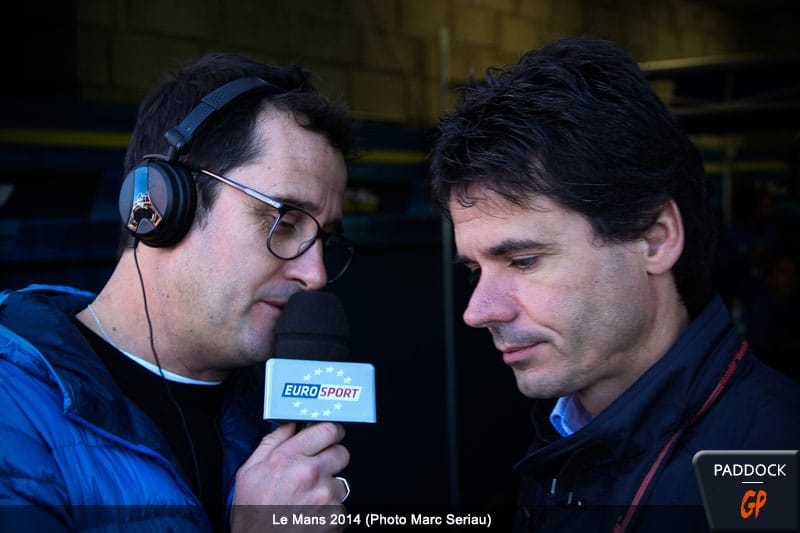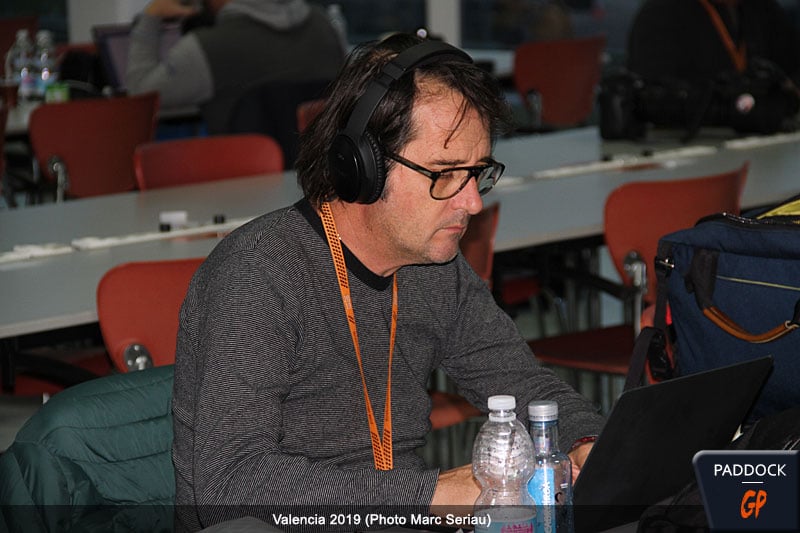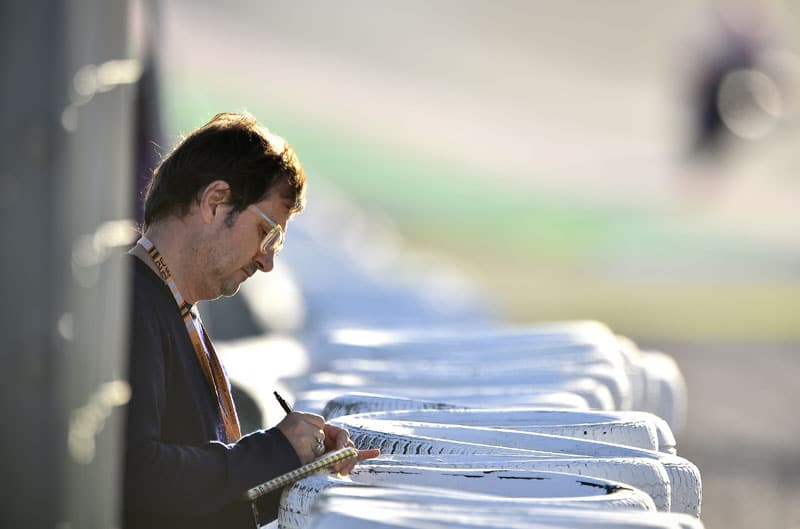Taking advantage of the forced break for MotoGP drivers and much less extensive sporting news, we offer you a gallery of the main French-speaking personalities of the paddock who, each, represents one of the countless cogs essential to the sumptuous spectacle that is the Grands Prix.
We often hear about the Spanish armada or the Italian troops, but you will discover that the French-speaking colony, rather numerous and very united, has no reason to be ashamed of the comparison.
In the light or more in the shadows, verbose or more discreet, each of these men shared with us with pleasure their world and their news, always with the same passion as a common denominator.
Little by little, you will be able to know a little better who are, and what is going on today, for example Claude Michy, Piero Taramasso, Hervé Poncharal, Eric Mahe, Nicolas Goubert, Bernard Ansiau, Guy Coulon, Christophe Bourguignon, Florian Ferracci, Christophe Léonce, Jacques Roca, Marc van der Straten, Miodrag Kotur, Alain Bronec, Jacques Hutteau, Michel Turco, David Dumain, Michaël Rivoire, and many others.
This long series of interviews will first be broadcast on the official MotoGP.com website in a refined version, before being accessible here in their raw version.
So, when the MotoGP Grands Prix resume, you will be almost unbeatable on the French-speaking part of a particularly cosmopolitan paddock...
Michel Turco, journalist for Moto Revue, GP Racing and occasionally for the Team.
What is your year of birth?
"1964"
How did the young Michel Turco develop a passion for motor sports?
“I was born in Toulon and my godfather took me to the Paul Ricard circuit to see my first Grand Prix in 1975. I was nine years old and I saw Johnny Cecotto winning: today, I still remember the smell of castor oil and the images are still accurate to what I saw there. These first emotions made the passion build, until the next race, in 1979, at the Bol d'Or. There, at 14, I went up there with friends to see Pons-Asami on the Yamaha 0W31 and Leon-Chemarin on the Honda. I'm amazed! I'm 14 years old, my 103 Peugeot and I manage to get Moto Revue and Moto Journal every Thursday. I love racing and I want to become a driver! In the meantime, we tinker with the Mobs in the garage. »
What are the main points of your career?
“I entered the Normal School of Teachers in 1984 then, thanks to my salary, I made the Yamaha Cup in 1985 with Jean-Philippe Ruggia who is my neighbor. In 1986, I did a bit of the French championship without much resources and without too many results, and I told myself that there was no point in continuing to ride motorcycles because I wouldn't succeed. But to stay in this environment, I send a letter to Bruno Gillet who is a journalist at Moto Journal and whose papers I read every week and whom I adore. I then became a sort of local correspondent by doing freelance work for Moto Journal: the Bol d'Or in 1987 then a bit of the French championship and test sessions at Paul Ricard. »
“In 1990, there were quite a few changes at Moto Journal: the editor-in-chief, Reynald Lecerf, left for Moto Revue then called me during the summer to offer to do the Grands Prix with Patrick Curtet as photographer. It was in 1991: I took leave from my job as a teacher and off we went, mainly for Larivière editions, but also with some external collaborations, daily press for L'Equipe, on TV for Eurosport where I played the role of pit reporter for several seasons, and today with Eurosport Events in post-production on the world endurance championship. I have also written several books, such as biographies of Valentino Rossi, or the Motorcycle Golden Book which summarizes the past season. ".
Throughout this journey, what were the most difficult moments?
“There are always good and bad memories, the seasons are more or less interesting and it is sometimes heavy to be constantly gone, but frankly, there has been no moment when I wanted to 'Stop. Obviously, when a pilot kills himself, it's always extremely hard, especially when you have a good relationship with him. For Marco Simoncelli, I experienced it live because I was on the HF microphone at that time: I was crying in front of the medical center, Régis Laconi was also crying in the Eurosport studio in Issy-les-Moulineaux. I'll never forget. Daijiro Kato, in 2003, I knew him less, Shoya Tomizawa very little, so it was different, but I remember Nobuyuki Wakai in 1993, who was at the time with the whole Japanese gang at Tech3, and so that we saw regularly. What's more, it happened before my eyes, while I was in the press room in Jerez... And then there was Wayne Rainey's accident which marked me forever. He was the first major champion I interviewed in December 1990, at Kenny Roberts' ranch in Modesto. »
“When you have the chance to be around these guys, and from one day to the next there is one who is seriously injured or who is no longer there, those are inevitably times when you wonder what you are doing there. But over time, passion takes over. »
Conversely, were there any particularly strong moments that brought tears of joy to your eyes?
“Tears of joy maybe not, but wonderful memories, yes. Ruggia's victories with the Aprilia in 93. Olivier Jacque's title. I remember his debut in 1995, when he arrived with the RS Kit in Australia. There, you tell yourself that you are going to experience something strong! And what Fabio Quartararo did this year is great! Just like Johann Zarco’s debut in MotoGP! As far as I am concerned, despite the wear and tear that I can sometimes feel, I tell myself that I am lucky to experience an extremely strong moment in French speed. We can't talk about renewal because if you take away these two guys, there's no one behind it, but we've never had a guy with as much talent as Fabio! And when Johann arrived in the premier category and broke the house, that was great too! Those are real highlights. »
“Afterwards, on a more personal level, becoming friends with those who made me dream when I started. When I arrived, I was 26 years old. At the time, the stars were called Doohan, Rainey, Schwantz, and were not easy to approach, especially since my English was very poor. Relationships were complicated and they quickly sent you away. But over time, we became friends and I sometimes go to their house. Having become closer to these people is an opportunity and a sort of personal satisfaction, because they made me dream when I was a kid. These are moments when you are quite proud. »
Can you take stock of this 2019 season?
“On a personal level, as a journalist, we are lucky to live in a press room where there is a good atmosphere between everyone. I don't know about other sports but when journalists from other sports come here, they are surprised by the fraternity that reigns here: we often exchange information between colleagues of different nationalities, even if, inevitably, there is always a little rivalry between those who want exclusivity. But overall, everyone helps each other, and it's quite nice: it also contributes to the desire to continue. »
“On a professional level, I necessarily deplore that Moto Revue has become monthly. Today, the future is not very clear because we are also in a time where the profession is evolving, with supports that are having a little difficulty finding their place. That's the negative side of what our job is today. »
What are the prospects for 2020?
“We already hope to continue to be there (laughs). So we hope to see Fabio fight for the title and Johann resurface. We would like Marc Márquez to win a few fewer races and leave a little room for others. »
What is your daily means of transportation?
“I live in Paris so I ride a Honda 300 Forza scooter, and otherwise I have a Ducati Scrambler that I use in the south of France to go for walks. It's a motorcycle that I love and that I discovered during its world presentation in California. I went there to do a piece for Moto Revue Classic and I fell in love with this little bike! I'm also lucky enough to have a friend called Bernard Garcia who regularly offers me a home run as part of 4G courses. »
*Interview collected during the GP in Valencia
In the same series, find the exclusive interviews withHervé Poncharal, Claude Michy, Piero Taramasso, Christophe Bourguignon, Eric Mahé, Marc van der Straten, Nicolas Goubert, Guy Coulon, Christophe Leonce, et Jacques Roca.






